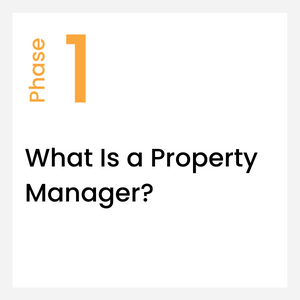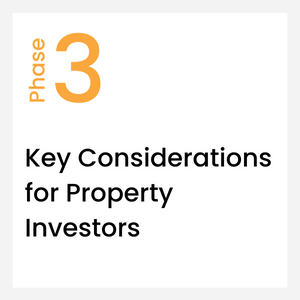
The Ultimate Guide to Finding a Property Manager
The role of a property manager is much more than just collecting rent and inspecting properties.

A property manager can be a valuable adviser for your investment property strategy, helping you to attract the best tenants, maximise rental income, and enhance the value of your property. High-performing property managers are knowledgeable in tenancy and property laws, and can help you with relevant paperwork and maintaining financial records to keep you fully compliant with the law. But how do you know if you need a property manager? And if you do, how do you go about selecting the right one?
Whether you’re overwhelmed by the demands of managing a property yourself or seeking to maximise value and returns from your property, we've put together this detailed guide to assist you in better understanding the role of a property manager. If you already know you could benefit from working with a property manager, our guide offers valuable insights for choosing an experienced property manager and the types of screening questions to ask prospective property managers. If you’re unsure about, or dissatisfied with your current property manager, our tips will clarify the warning signs that suggest you should think about finding a new one.
What is a property manager?
A property manager’s role is to maximise the revenue generated for a rental property and minimise exposure to risk. Property managers help look after investment properties for owner-landlords with key duties including tenant screening, collecting rent, liaising with tenants, and property maintenance. However, a property manager can also handle nearly everything involved in maintaining and renting out your investment property, from daily tasks like repairs to bigger-picture processes like marketing.

01.
What is a property manager?
A property manager’s role is to maximise the revenue generated for a rental property and minimise exposure to risk. Property managers help look after investment properties for owner-landlords with key duties including tenant screening, collecting rent, liaising with tenants, and property maintenance. However, a property manager can also handle nearly everything involved in maintaining and renting out your investment property, from daily tasks like repairs to bigger-picture processes like marketing.

Key Roles of a property manager
Leasing is a property manager’s main goal, focusing on leasing the property to the best tenant,
in the fastest time and for the best rent.
Your property manager’s exact responsibilities will differ depending on your engagement contract; for example, whether you have a leasing-only or a leasing-and-maintenance agreement. However, the following are some of the main tasks property managers will undertake:
Finding tenants
Your property manager will advertise your property and highlight its standout features to attract the best tenants. They’ll screen tenants by conducting rental history checks and employment confirmations to reduce the risk of tenants who can’t meet the obligations of their lease term.
Property issues
Property managers act as a buffer between you and the tenant. They look after everyday property issues like repairs, damage, tenant complaints and questions, and late payments. They’re accessible to the tenant and use regular property inspections as a means of keeping you informed of the property’s condition and what upkeep might be required, before it becomes an OH&S risk or a more costly job.
Ongoing maintenance
Any ongoing maintenance requires timely attention, and your property manager can take care of this as well. They’ll have a network of reliable and qualified tradesmen with whom they can negotiate better prices for jobs.
Move-ins and move-outs
Your property manager will handle tenants moving in and moving out, ensuring there’s no damage during the process and checking that departing tenants leave the property in good condition. They’ll take care of the condition report, tenancy agreement signing process, and any related legal requirements.


Conduct property viewings
Viewings are essential for attracting tenants. Property managers respond to viewing requests and supervise viewings so you don’t have to be there during property viewings.
This also facilitates a discussion of the requirements with the prospective tenants, maximising opportunities to match the right tenant with your property.
Evictions
Property managers understand the circumstances under which you can evict tenants. If you have problematic tenants, such as those who don’t pay rent on time, your property manager knows how to proceed with legally compliant processes for eviction. For example, you might need to give the tenant sufficient notice in a certain format.
Regular inspections
A property manager carries out periodic inspections to check your property is in good order and the lease terms are being met. This is a great time for them to review the rental amount being paid and enter discussions with you about whether a lease renewal fits with your future plans.
Legal matters
Your property manager is knowledgeable in legal and compliance matters like lease termination and property safety, so they can ensure you fulfil your legal obligations as a landlord.


Maximise returns
A great property manager works to minimise periods of vacancy, maximise rental returns, and secure a steady income stream by enforcing timely rent collection. They'll regularly review rent rates as they apply to your local market and property type while working to lower tenant turnover.
Financial accounts
Property managers look after financial accounts and reporting for your investment property, including tax deductions and budgeting for expenses and bills, to keep you up to date and compliant with the tax office.
Protect capital growth
Property managers can help protect capital growth through maintenance, repairs, upgrades, changes, and regular inspections for damage.
02.
The benefits of using a property manager
Even the most financially savvy property investors can find themselves confused or short on time when it comes to managing investment properties - this is where an experienced property manager can be highly beneficial. Here are some of the top benefits of using a property manager:
01
Accessibility
Your property manager is on hand to help, meaning they can answer tenants’ questions, take care of emergencies, and keep tenants happy, leaving you unburdened and free to focus on your priorities
02
High quality tenants
Experienced property managers have processed hundreds of rental applications. This means they’re highly experienced in screening tenants, undertaking processes like reference checks and rental history reviews so you can end up with tenants who pay on time and are less likely to damage the property. Property managers also have access to National Tenancy Databases to support the tenant-auditing process.
03
Professional relationship
As mentioned previously, a property manager acts as a buffer between you and your tenants. This means you can avoid having to deal with unpleasant confrontations, tenant complaints, and late payments. Without the professional distance, you may find it challenging to enforce things like payment deadlines.


04
Turnover and vacancy
An experienced property manager will work to minimise tenant turnover and vacancy rates, as both can erode your income. Marketing, setting rent correctly, local market research, timely repairs and maintenance, and strategies to keep tenants happy – these are part of the property manager’s toolbox for reducing turnover and vacancy.
05
Income and cash flow health
Effective property managers will ensure tenants pay on time by using consistent rent collection strategies, saving you from having to chase up late payments every month. They'll also keep you up to date with current appraisals, rental-yield trends, and market conditions for accurate rent reviews.
06
Return and capital growth
Skilled property managers adopt an investor’s mindset towards your property. They'll keep your rental prices in line with market conditions so you fully leverage your property for income. They’ll also undertake preventative maintenance, repairs, and upgrades to preserve or increase the value of your property.
07
Financial records
Your property manager will make sure you keep accurate and detailed financial records for compliance and reporting, including trust accounting accounts and records for things like tenant deposits and rent payments. Comprehensive financial records also offer insights into income and expenses, so you can make smarter decisions about your property, such as reinvesting income for renovations.
08
Legal and compliance
Property managers are well-versed in the relevant legal rules and requirements. An experienced property manager understands paperwork requirements, tax deductibility, contract terms, tenancy laws, eviction processes, termination of contract, and notification requirements. They can manage tenancy breaches and disputes, and look after bonds and bond releases. Legal and compliance considerations become particularly important when it comes to things like the tenancy agreement signing process, local council regulations, and fulfilling your duties as a landlord.
09
Insurance and property compliance
A property manager can discuss with you the reasons why a more comprehensive landlord insurance policy is important. This type of policy could cover situations like malicious and accidental damage, legal liability, and the loss of rental income. They can also help you remember to install property compliance items such as smoke alarms.


10
Tax deductibility
A property manager costs around 5-10% of your total rental income. Having a property manager can be seen as an investment into the property to increase the value and in many cases their feed is tax deductible. When choosing the right property manager for you, it's also really important to compare what services and experience you receive for what you are paying - the cheapest agent, will be the one who keeps the most money in your pocket, not necessarily the one charging the least.
11
Property viewings
Property managers set up and supervise property viewings as part of the tenant-sourcing process. This can involve after-hours appointments, saving you from having to manage these yourself.
This can involve after-hours appointments and enquiry management, saving you from having to manage these yourself.
12
Maintenance and repairs
Property managers carry out regular inspections to check your property for damage, and will inspect the property as part of exit and entry condition reports processes. If you need repairs or maintenance, they'll make sure these are performed in a timely manner. This not only keeps tenants happy, but it can also allow you to identify small problems before they turn into bigger issues. It could also help you avoid liability if a tenant is injured due to delayed repairs.
13
Contractor relationships
Seasoned property managers will have strong relationships with licensed tradespeople. This could help you get the best price and service quality on maintenance and repair jobs.
14
Risk management
A property manager could reduce your overall risk as a landlord. Their expertise on legal matters, tenant screening, insurance, and financial management can help you avoid costly mistakes and lost income. Other things like regular inspections can prevent damage from occurring and protect your interests as an owner of investment property.
15
Save time and reduce stress
Landlord responsibilities can be highly stressful and time-consuming. Having a property manager attend to everything frees up your time and helps you avoid unnecessary stress. If you have multiple properties, you’ll save a significant amount of time and be confident that an expert is looking after everything.
Are you ready to get a better understanding of where your investment property stands in the current market today? Get a free expert property appraisal with an LJ Hooker agent today.
Are you ready to get a better understanding of your investment property's true rental potential? Get in touch with your local LJ Hooker property manager today to get a free expert rental appraisal.


Sufficient time and energy
Property management involves a long list of tasks and responsibilities, and these typically require strong attention to detail. Assess whether you have the time and energy to deal with the day-to-day responsibilities. These include marketing, screening and managing tenants, inspections, and chasing up late payments. A property manager is valuable if you don’t have the ability to be hands-on with your property and don’t mind the idea of giving up control of the daily processes.
Location
If you don’t live near your property, a property manager is likely the best option as they can attend to emergencies. They’re also likely to have the necessary knowledge and connections with contractors and tradespeople in the area.
Tenant relationships
Without a third party, you’ll need to manage everyday tenancy matters yourself. This can include issues like bond inspections, demanding outstanding rent, and reinforcing terms of contract. If you have a low tolerance for tenant complaints, a property manager is advisable as they can maintain a professional relationship with tenants on your behalf.
Affordability
Your property management fees might turn out to be well worth the investment. If you can afford the relatively modest fee for a property manager (7-10% of your total rental income and tax deductible), the time savings, rental yields, lower vacancy rates, and other benefits might be worth the cost.
Location
If you don’t live near your property, a property manager is likely the best option as they can attend to emergencies. They’re also likely to have the necessary knowledge and connections with contractors and tradespeople in the area.
Multiple properties
The more properties you have to manage, the more likely you’ll benefit significantly from using a property manager. With each additional property, maintenance issues, repair work, complaints, and vacancies are multiplied. Reputable property managers are often supported by dedicated software and technology systems, administrative staff, and successful processes that facilitate effective management regardless of the scale.
Research and compliance
If you’re happy to do plenty of research and are confident you can stay up to date with ever-changing law requirements in your state/territory, you might be able to successfully manage a property yourself. However, you’ll be reviewing your own lease contracts and will need to be confident that your dealings with tenants abide by the applicable laws, including those concerning tenants’ rights and landlords’ duties. If you’re unsure you can do all of these tasks, getting a property manager to do them for you might be the best option.


Experience
If you know little about property management but decide to take the plunge with managing it yourself anyway, you could be setting yourself up for costly errors. High vacancy rates, choosing a poorly qualified contractor for repairs, and failing to screen out difficult tenants can cost you a significant amount of money. Other issues include compliance, legalities, and the risk of liability. A property manager will help you to avoid these issues using their experience.
Working with contractors
Without a property manager, you’ll be working directly with contractors for repairs, upgrades, and maintenance. This requires you to research, hire, and check their work. For time-short people and landlords who’d prefer not to manage contractors in addition to tenants, a property manager can take care of it.
Get a detailed breakdown of your property's size, location, potential areas of improvement, how it compares to similar local properties, and much more. Get a free expert rental appraisal with an LJ Hooker property manager now.
Local knowledge
Sufficient local knowledge supports marketing to the right tenants, setting rent correctly, and creating and maintaining strong relationships with tradespeople.
Customer reviews
Client reviews give you an honest opinion on the property manager’s track record. Check online for customer reviews and testimonials on the property manager.
Service scope
Some property managers offer only rent-payments management and property maintenance. You’ll likely benefit from a manager who offers a wide service scope and can take care of most things on your behalf.
Marketing
A high profile property management agency with high website traffic, proficiency with rent lists, and other marketing strategies could help you market your property more successfully.
Communication
The property manager should be prompt in getting back to you and proactively keep you updated.


Cost
You’ll typically be paying 7-10% of your total rental income for a property manager. Cost is an important consideration, but you won’t end up with a great property manager if you only consider price. Weigh up their pricing in the light of their service scope, standards, and expertise.
Contract
Property managers should be able to draw up a valid, fair, and comprehensive contract that addresses the rights of the tenant, as well as your interests as a landlord.
Ongoing professional development
Your property manager should be committed to a high level of professional development, including training to keep up to date with ever-changing tenancy laws.
Process knowledge
An effective property manager is knowledgeable in the ins and outs of residential leases like lodging the bond, paying insurance and outgoings, repairs and maintenance, and managing tradespeople.
Want to Find out What Your Investment Property Is Really Worth?
Sign up for an expert rental appraisal with an LJ Hooker agent.
What Questionsto Ask in a Property Manager Interview
An interview with a property manager gives you the opportunity to get to know potential managers, their experience, and their track record. The right questions can help you find out more about their processes, practices, and service standards.

The agency and agent:
- What is your average time on market?
- How are tasks allocated within the team?
- Does your agency have a dedicated property management department?
- How many years of experience do you have in property management?
- What differentiates you from other agencies or property managers?
- What documented systems do you have in place for property management?
- What are the occupancy/vacancy rates for properties under your management?
- How many inspections do you do each year and what is the cost for these?
- May I see some references from satisfied clients?
- Does the agency have documented experience standards?
- What training and professional development programs do you participate in to ensure you’re up to date with laws and regulations?
Rent:
- How many properties do you or your agency rent out each month?
- Can you provide me with a written comparison of rental values in the market?
- How do you deal with rent in arrears?
- How will my rental income be paid to me?
- How often will you transfer my rental funds into my account? May I see a sample statement?


Communication and support:
- Who will I be dealing with from your office and will I only have one point of contact?
- How are tasks allocated within the team?
- How frequently will you be in touch with me and what form will it take?
- What human resources and support staff does your agency dedicated to leasing properties?
- How many staff will be looking after my property?
- What happens if my property manager is sick or on holidays?
Tenants:
- How do you handle disputes with tenants?
- How would you market my property to attract the best tenants?
- Do you personally show prospective tenants through properties during viewings or just hand out the keys?
- What information do you collect from applicants and what checks do you carry out to screen them?
Services:
- Will I get a written proposal and formal service contract?
- If I’m unhappy with your property management services, can I release myself from the contract?
- What checks do you conduct on contractors and their licensing and insurance?
- Do you provide a service guarantee?
- Does your service include going to court to represent landlords in the case of difficult tenants?


Repairs and maintenance:
- How do you deal with repairs and maintenance, including urgent ones?
- Do you check in with me before any repair or maintenance work is done?
Fees:
- How are your fees calculated?
- What is the full cost of management? Please detail all costs and fees and show where GST is payable.
How to Know When You Need a New Property Manager
Finding a new property manager is important if you’re not getting the best service from your current one. But how do you know if you should start looking for a new property manager?
Not providing the basics
If your property manager is failing to fulfil key responsibilities consistently, you should consider changing. Annual inspection, bond collection, and rent reviews and adjustments are some of their key duties they must fulfil. Poor quality tenants and escalating tenant complaints that go unaddressed could be signs your property manager is neglecting their duties.


Limited service
Your current property manager might be providing only a limited range of services, like rent-payment management and basic maintenance. You might be managing the marketing, tenant screening, rental appraisals, and inspections yourself. This type of service model can mean missed opportunities, like better tenants and higher rent. Quality property managers will look after everything for you so you’re getting the most out of your property.
Compliance with service contract
Your property manager should always act ethically and in your best interests. If your property manager has breached the terms of your contract in some way, it’s a sign you should probably move on.
Maintenance outcomes
Poor maintenance outcomes are a top reason to switch as these can compromise the value of your investment property, ability to attract tenants, and rental income. Maintenance emergencies can cost you if they’re not attended to in a timely manner, and can also impact tenant safety and your landlord duties.
Late payments
If your tenants are always paying late, your property manager might be failing to enforce payment terms and conditions, and this can have negative impacts on your cash flow.
Lack of expertise
Your property manager might lack basic expertise in things like screening tenants and tenancies laws. If they don’t keep up with the latest regulations and fail to find quality tenants, this puts you at risk of poor compliance and lost income.
High vacancy and low rent
If you’re experiencing high vacancy rates or your rental income seems lower than it should be, your property manager could be underperforming and it might be time to change.

Discover Your Home's Potential With a Free LJ Hooker Rental Appraisal
REQUEST A FREE APPRAISALDISCLAIMER - The information provided is for guidance and informational purposes only and does not replace independent business, legal and financial advice which we strongly recommend. Whilst the information is considered true and correct at the date of publication, changes in circumstances after the time of publication may impact the accuracy of the information provided. LJ Hooker will not accept responsibility or liability for any reliance on the blog information, including but not limited to, the accuracy, currency or completeness of any information or links.




.png?width=300&height=300&name=Phase%202%20Invest%20(2).png)